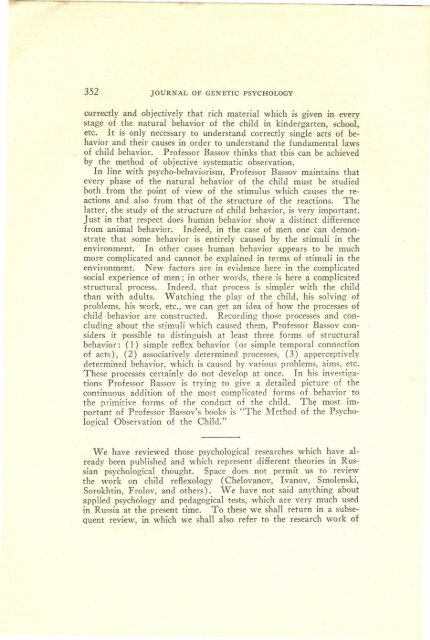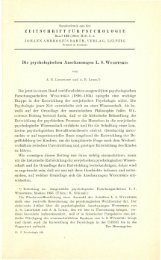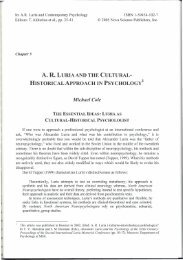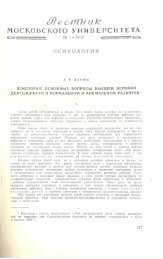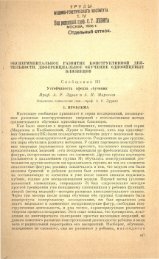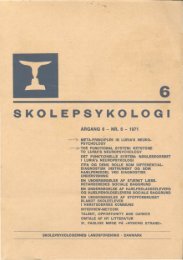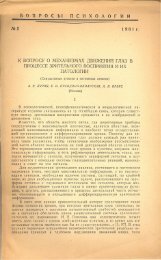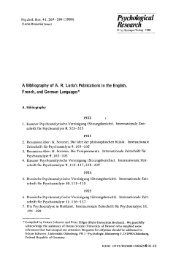Psychology in Russia - Luria, Alexander R.
Psychology in Russia - Luria, Alexander R.
Psychology in Russia - Luria, Alexander R.
You also want an ePaper? Increase the reach of your titles
YUMPU automatically turns print PDFs into web optimized ePapers that Google loves.
352 JOURNAL OF GENETIC PSYCHOLOGY<br />
correctly and objectively that rich material which is given <strong>in</strong> every<br />
stage of the natural behavior of the child <strong>in</strong> k<strong>in</strong>dergarten, school,<br />
etc. It is only necessary to understand correctly s<strong>in</strong>gle acts of behavior<br />
and their causes <strong>in</strong> order to understand the fundamental laws<br />
of child behavior. Professor Bassov th<strong>in</strong>ks that this can be achieved<br />
by the method of objective systematic observation.<br />
In l<strong>in</strong>e with psycho-behaviorism, Professor Bassov ma<strong>in</strong>ta<strong>in</strong>s that<br />
every phase of the natural behavior of the child must be studied<br />
both from the po<strong>in</strong>t of view of the stimulus which causes the reactions<br />
and also from that of the structure of the reactions. The<br />
latter, the study of the structure of child behavior, is very important.<br />
Just <strong>in</strong> that respect does human behavior show a dist<strong>in</strong>ct difference<br />
from animal behavior. Indeed, <strong>in</strong> the case of men one can demonstrate<br />
that some behavior is entirely caused by the stimuli <strong>in</strong> the<br />
environment. In other cases human behavior appears to be much<br />
more complicated and cannot be expla<strong>in</strong>ed <strong>in</strong> terms of stimuli <strong>in</strong> the<br />
environment. New factors are <strong>in</strong> evidence here <strong>in</strong> the complicated<br />
social experience of men; <strong>in</strong> other words, there is here a complicated<br />
structural process. Indeed, that process is simpler with the child<br />
than with adults. Watch<strong>in</strong>g the play of the child, his solv<strong>in</strong>g of<br />
problems, his work, etc., we can get an idea of how the processes of<br />
child behavior are constructed. Record<strong>in</strong>g those processes and conclud<strong>in</strong>g<br />
about the stimuli which caused them, Professor Bassov considers<br />
it possible to dist<strong>in</strong>guish at least three forms of structural<br />
behavior; (1) simple reflex behavior (or simple temporal connection<br />
of acts), (2) associatively determ<strong>in</strong>ed processes, (3) apperceptively<br />
determ<strong>in</strong>ed behavior, which is caused by various problems, aims, etc.<br />
These processes certa<strong>in</strong>ly do not develop at once. In his <strong>in</strong>vestigations<br />
Professor Bassov is try<strong>in</strong>g to give a detailed picture of the<br />
cont<strong>in</strong>uous addition of the most complicated forms of behavior to<br />
the primitive forms of the conduct of the child. The most important<br />
of Professor Bassov's books is "The Method of the Psychological<br />
Observation of the Child."<br />
We have reviewed those psychological researches which have already<br />
been published and which represent different theories <strong>in</strong> <strong>Russia</strong>n<br />
psychological thought. Space does not permit us to review<br />
the work on child reflexology (Chelovanov, Ivanov, Smolenski,<br />
Sorokht<strong>in</strong>, Frolov, and others). We have not said anyth<strong>in</strong>g about<br />
applied psychology and pedagogical tests, which are very much used<br />
<strong>in</strong> <strong>Russia</strong> at the present time. To these we shall return <strong>in</strong> a subsequent<br />
review, <strong>in</strong> which we shall also refer to the research work of


